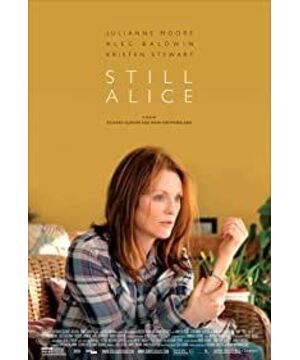As a feature film, the film can be said to have no plot, let alone complex interpersonal relationships. It has to be said that it is only describing a process of illness, and during this process, the film develops in a chaotic direction, and there is no Give a clear plot direction. It is this kind of drama that does not look like a drama but truly depicts the psychology and situation of the characters suffering from Alzheimer's disease. It can best reflect the pain of real patients. With unwillingness, it is closer to reality to give us a comprehensive understanding and feeling. This kind of cognition and confusion that does not seem to be very serious but brings people countless confusion and confusion, is almost the same as ordinary people in ordinary life. Death will not be tortured by illness, nor will it give rise to the fear of being oppressed by her heart all day long, but she slowly forgets everything, forgets her memories, and even forgets herself in the end. Death is more terrifying, it makes you forget everything and even how to die, the darkness of ignorance is endlessly terrifying. The movie presents us well as a realistic story based on the disease. There is no overly hypocritical aphrodisiac, and there is no rigid arrangement of the plot. It just restores a more realistic development process of the disease, and tells the whole family together. The story of how the members get along during the development of the disease, the kind of affinity that slowly infects everyone through the film, and the hardships of life and disease that lead the story to an unknown climax. The director did not deliberately The movie arranges a clear purpose, and does not set a fixed ending. It is open to let the fate of the characters follow the characters at will, and the uncertain development can bring people the most real feelings. Of course, the most important element for the success of this film is the performance of the character actors. The design and performance of the entire character determines whether the story is successful or not. Obviously, the heroine Julianne Moore's performance is very good. Out of such a role, she almost truly interprets as a patient with Alzheimer's disease. You can't see the false ingredients contained in it at all, and you can feel sympathy for the fate of the characters she created. and moved.
Julianne Moore's performance in the movie is obvious to all, and this is also a testimony to her winning the Oscar for Best Actress. The emotion of the role she plays can make us feel so real all of a sudden. Being able to deeply capture the soul of the character, let's watch this movie is like watching a documentary, recording every little bit of her daily life, and the performance with a great sense of camera makes this character move towards a kind of almost perfect. You can't even see any performances in it, it seems to be the real, most real existence. Of course, the two directors also designed her role very delicately, allowing the camera to capture every subtle movement of her and add it to the film to form a part of the film, so that the delicate performance matches the development of the story. Contrasting the character's desolate and sad heart, of course, the character gives us a very depressing feeling, and she even has a trace of self-hatred, but as the disease progresses, it turns into hysteria, which makes the plot move towards a rather intriguing Psychological extension.
As a medical drama, the film does not advocate and sensationalize to drive our attention to Alzheimer's disease. Instead, it uses a flat and pragmatic attitude to experience the feeling brought by this disease. It is real In the performance, it is very rational for people to judge, and does not deliberately create an atmosphere. It just tells the process of an ordinary family getting sick. This disease does not endanger life, but it gives the patient a kind of pain that slowly corrodes the spirit. Slowly corroding people's minds, and even making patients forget the idea of how to commit suicide, this is the most painful undertaking and the most pitiful fate.
View more about Still Alice reviews











